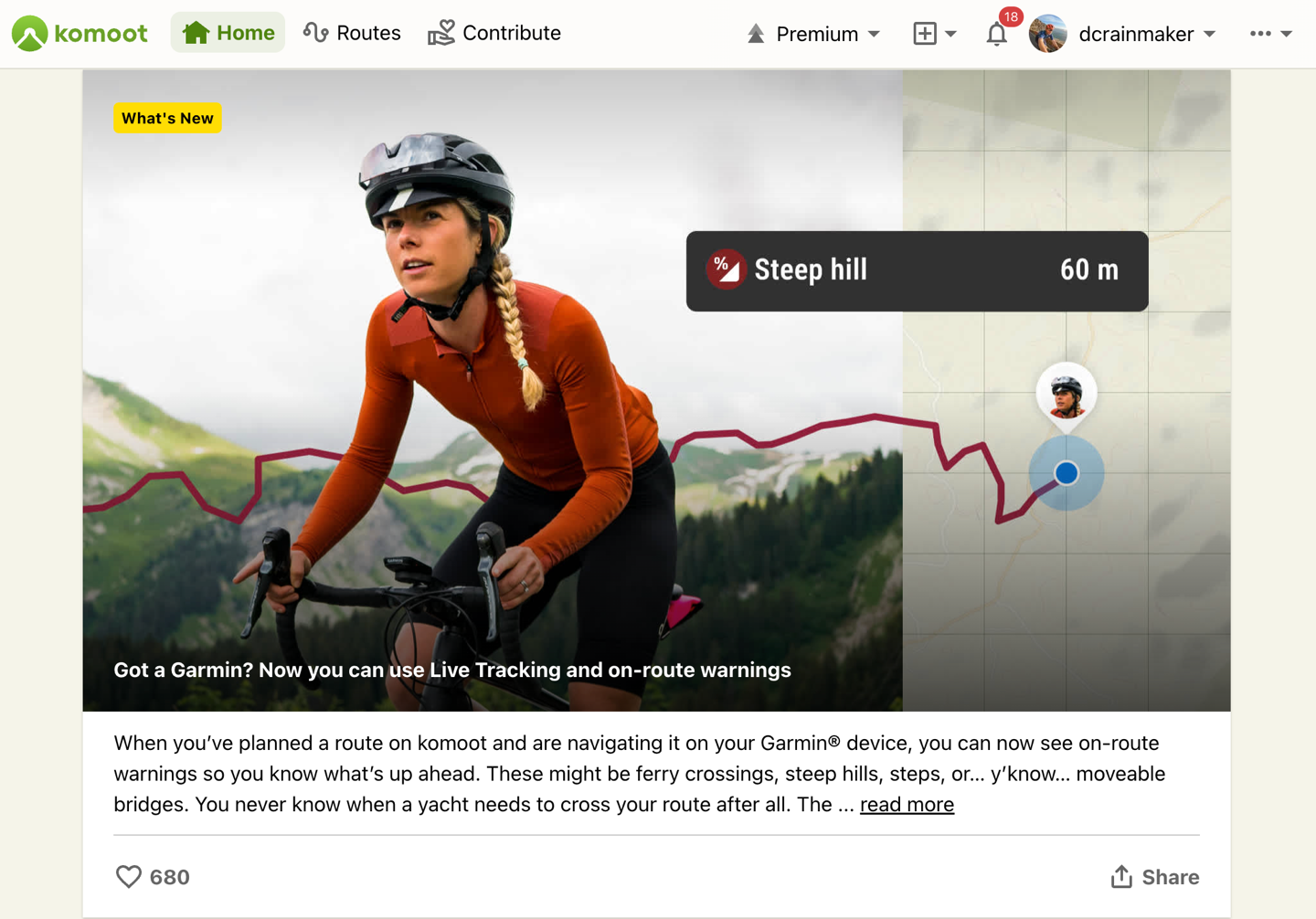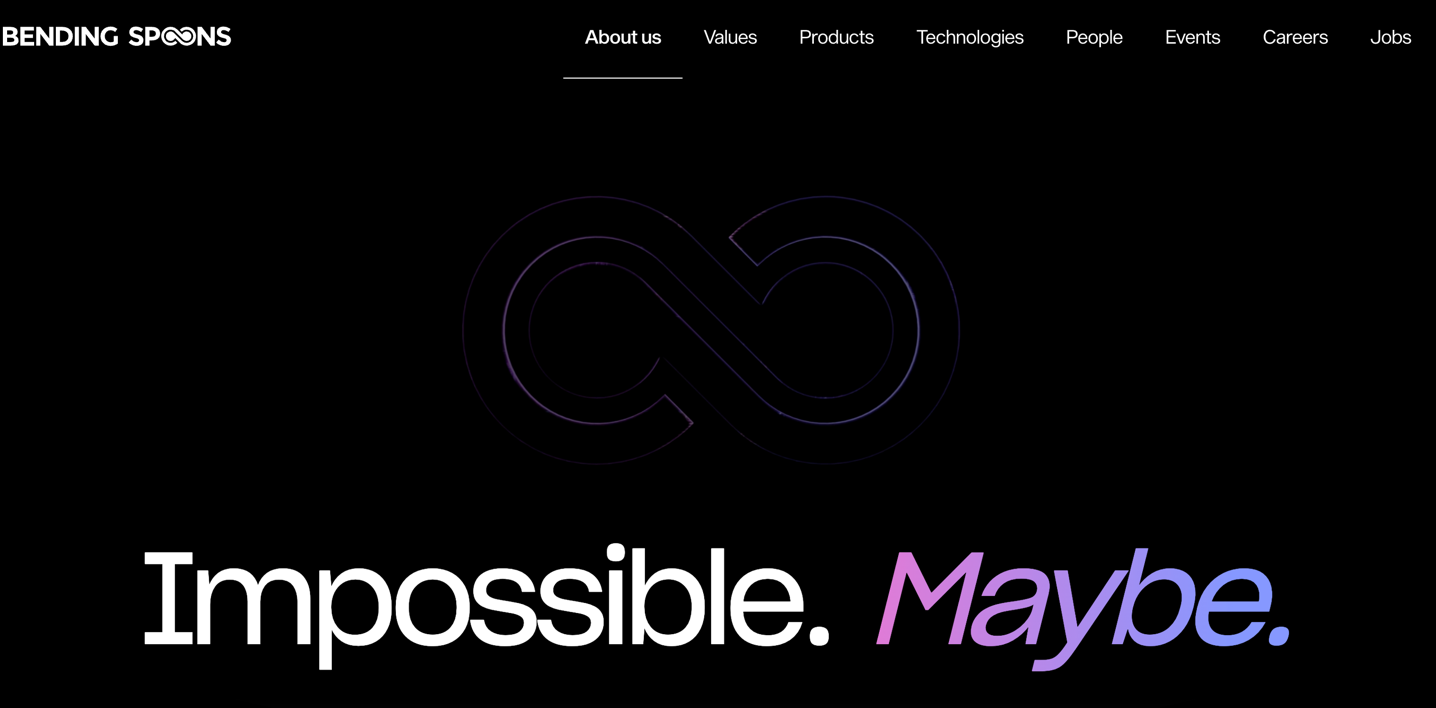
And now things start to make a bit more sense. Earlier this week I posted on the news that Komoot was changing to require a Premium subscription for users to sync routes to 3rd party devices like Garmin, Wahoo, Hammerhead, and others. Komoot did make a carve-out for existing users who bought something previously, effectively grandfathering them in. Still, as I outlined in my piece, the move seemed a bit tone-deaf relative to the rest of the route-planning competitors (which allow it on free accounts).
But, now things are becoming a bit more clear. The Komoot policy change actually happened back on Feb 27th, and today, March 20th, the company has announced that it’s been acquired by Bending Spoons, which bills itself as a technology company (rather than a private equity or other investment apparatus). Though, in reality, history shows otherwise.
The Official Communication:
The press release announcing the acquisition is incredibly light on details (the first sign bad things are to come). There’s no FAQ, no mention of existing staff, no mention of specific ways they plan to leverage each other, etc…No communication to end users, just a single press release filed to the wire service:
MILAN–(BUSINESS WIRE)–Technology company Bending Spoons today announced that it has closed the acquisition of komoot, the Germany-based route-planning platform for adventurers and outdoor enthusiasts worldwide.
Markus Hallermann, komoot’s CEO and co-founder, said of the acquisition: “For 17 years, we have been on a mission to make outdoor adventures accessible to all. From humble beginnings in our student rooms, we’ve built komoot from the ground up and grown it to 45 million users, making it Europe’s leading outdoor platform. Komoot inspires millions to explore the outdoors, improving both physical and mental well-being, and continues to grow worldwide. However, what got us here won’t take us to the next level. Scaling a company requires a different mindset and skill set than building one. That’s why we believe Bending Spoons, with its unique expertise in driving innovation and scaling platforms, is the perfect partner to lead komoot into the future.”
Luca Ferrari, the Bending Spoons CEO and co-founder, said: “We’re deeply impressed by komoot’s achievements over the past seventeen years, and are enthusiastic about its future growth potential. By leveraging the Bending Spoons expertise and platform technologies, we’re confident we can help komoot go from strength to strength for many years to come.”
Advisors and investors:
Investors that supported the journey of komoot are: KRW Schindler, Outdoor Secondary, MBG Beteiligungsges. Berlin-Brandenburg, and LP Capital (Liquid Partners). Perella Weinberg Partners served as exclusive financial advisor to komoot, and Osborne Clarke served as the company’s legal advisor.
Freshfields served as legal advisor to Bending Spoons. EY Advisory S.p.A. provided financial and tax due diligence services. J.P. Morgan and Intesa Sanpaolo served as the company’s financial advisors.
About komoot:
Komoot is a thriving digital platform for adventurers and outdoor enthusiasts around the world. It’s driven by a simple goal: to help people explore more of the outdoors wherever and however they want.
Komoot’s mobile apps and platform provide advanced route planning and navigation tools. At the same time, a content-rich feed of unique stories and adventures inspires its community of over 45 million users to explore and share their outdoor experiences and recommendations.
About Bending Spoons:
Bending Spoons has served a billion people across the globe through its suite of digital technology businesses, including Brightcove, Evernote, Meetup, Remini, StreamYard, and WeTransfer. Its products are currently used by more than 300 million people each month.
Got all that? Yeah, it’s not much.
Who Is Bending Spoons?

Now, who the heck is ‘Bending Spoons’?
Well, the snippet above throws out some well named brands: Evernote, Meetup, WeTransfer, for example. However, let’s look at what happened to each of those, according to Wikipedia and various other sources:
Evernote: Acquired in January 2023, in July 2023 Bending Spoons laid off all Evernote staff and transferred the operations to Bending Spoons HQ.
Mosaic Group: Acquired in January 2024, immediately laid off all 330 staff members, folded operations into Bending Spoons HQ.
WeTransfer: Acquired in July 2024, in September 2024 laid off 75% of all staff.
MeetUp: Acquired in January 2024, in February 2024 laid off a “significant” portion of the workforce
Brightcove: Acquired in November 2024, yesterday, March 19th, laid off 2/3rds of US employees
This is in addition to other less-high profile acquisitions, such as Filmic in 2022 (laid off everyone).
In all of these cases, Bending Spoons has simply taken companies that are generally software as a service/platform based, and then pulled the website into their existing IT infrastructure and laid almost everyone off. Of course, that doesn’t mean innovation stops. If we look at Evernote for example, there’s been plenty of feature improvements since then.
But if there’s one thing I know about sports technology companies, is that it takes an unusually high understanding of sports at the IT and development level in order to make a company successful. All the most successful sports tech companies in this industry have people who live and breath sports on a daily basis. Everything from racing to ultra events, to going deep in the woods on silly adventures. In other words: The core audience of Komoot has to be reflected in the developers of Komoot. To date, those two have been aligned.
Whether or not that remains the case going forward, after what history has shown us will be mass layoffs (potentially every single person in the company), remains to be seen. Without any assurances in the press release about those staff, or future features, there’s absolutely zero reason for users to stick around.
Astoundingly, if you re-read this press release, both the Komoot side and the Bending Spoon side is very clear about that. In fact, I’d argue that Komoot’s CEO’s quote is the death blow, saying:
“However, what got us here won’t take us to the next level. Scaling a company requires a different mindset and skill set than building one.”
Seriously? Talk about a slap in the face to your employees (and for the mater, your customers that filled your platform full of the content that routing, collections, and photo actually makes you successful).
Let’s be frank, Komoot: What got you here is catering to our audience. Not IT scale. IT scale hasn’t been your issue. But perhaps they aren’t talking IT scale, perhaps they’re talking marketing/commercial scale. But if we look at Bending Spoons history, it’s hard to say that any of these acquisitions have resulted in substantial increases in scale/reach/brand awareness.
What the future will bring exactly, of course, remains to be seen. But if I were in charge of Komoot, I certainly wouldn’t be putting out bland half-assed press releases hoping that users stick around and pay more for a Premium subscription. Cause if there’s anything I know about nutcases like myself that use Komoot to plan stupid long adventures into the woods: We ain’t got any time for lack of answers and lack of planning – we’ll simply move on to the next site.
How is it that a site that’s literally focused on helping people plan the road ahead, didn’t bother to plan to send out an e-mail to their users notifying them of the acquisition, is beyond me (or, simply, pretty telling).
With that, thanks for reading!
0 Commentaires